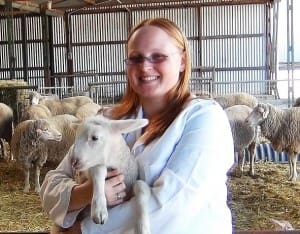A STRESS test for sheep is a likely outcome of a new research project.
Researchers are hoping to develop a simple on-farm test for testing stress levels in sheep, which would have implications for animal welfare, wool production and meat quality.
Better equipping sheep producers to identify stressed sheep and their progeny within their flock, and benchmark this performance against other flocks in their respective districts, is the goal of the new industry research project.
The Sheep CRC said preliminary results of research trials have been promising, with indications that wool cortisol is heritable and closely related to a number of wool traits affected by chronic stress, including staple strength and fleece weight.
Research scientist and Sheep CRC post-graduate Cathy Burnard said the results raise several questions about wool cortisol as a potential measurement of stress levels in sheep.
“This will give us the confidence to fine-tune our latest research and determine such things as whether varying cortisol levels in different sections of the wool fibre are related to historical stresses.
“And, is there a clear relationship between blood cortisol and wool cortisol in determining chronic stress in sheep?” she asked.
“We now know that if a ram has high wool cortisol his progeny are also more likely to and the trait is closely related to staple strength and fleece growth, so in the not too distant future we want to look at developing a cheap and intuitive on-farm test for sheep producers.
“The test would enable producers to take samples of fleece, and send them into the lab for testing,” Dr Burnard said.
“This will provide an indication of the welfare status of their flock and identify animals more at risk of stress.”
Dr Burnard, who recently completed her PhD studies as part of the Sheep CRC’s post-grad training program, is taking a lead role as a post-doctoral research scientist investigating wool cortisol as a potential indicator of stress in sheep.
Working full time at the University of Adelaide on research projects in a similar field to her PhD study, she is living testament to the value of Sheep CRC’s post graduate program.
“My PhD investigated the relationships between sheep temperament and meat quality, with the major findings indicating that in animals subject to chronic stress on-farm prior to slaughter there was a detrimental impact on meat eating quality.
“We will be investigating this relationship between chronic stress and meat eating quality further, looking at whether wool cortisol is related to the quality of the sheep meat and if we can identify at risk animals prior to slaughter,” she said.
“This work has the potential to impact on all facets of the sheep industry, improving welfare as well as wool and meat quality.”
The Sheep CRC each year sponsors a number of post-graduate students to undertake postgraduate research programs. Graduate tracking surveys completed between 2009 and 2013 demonstrated that 70 per cent of postgraduates have since found employment directly within the sheep and cattle industries, and that 90 per cent have been retained more broadly within agriculture.
- More information on applying for Sheep CRC sponsored post-graduate training positions is available at www.sheepcrc.org.au
Source: Sheep CRC


HAVE YOUR SAY